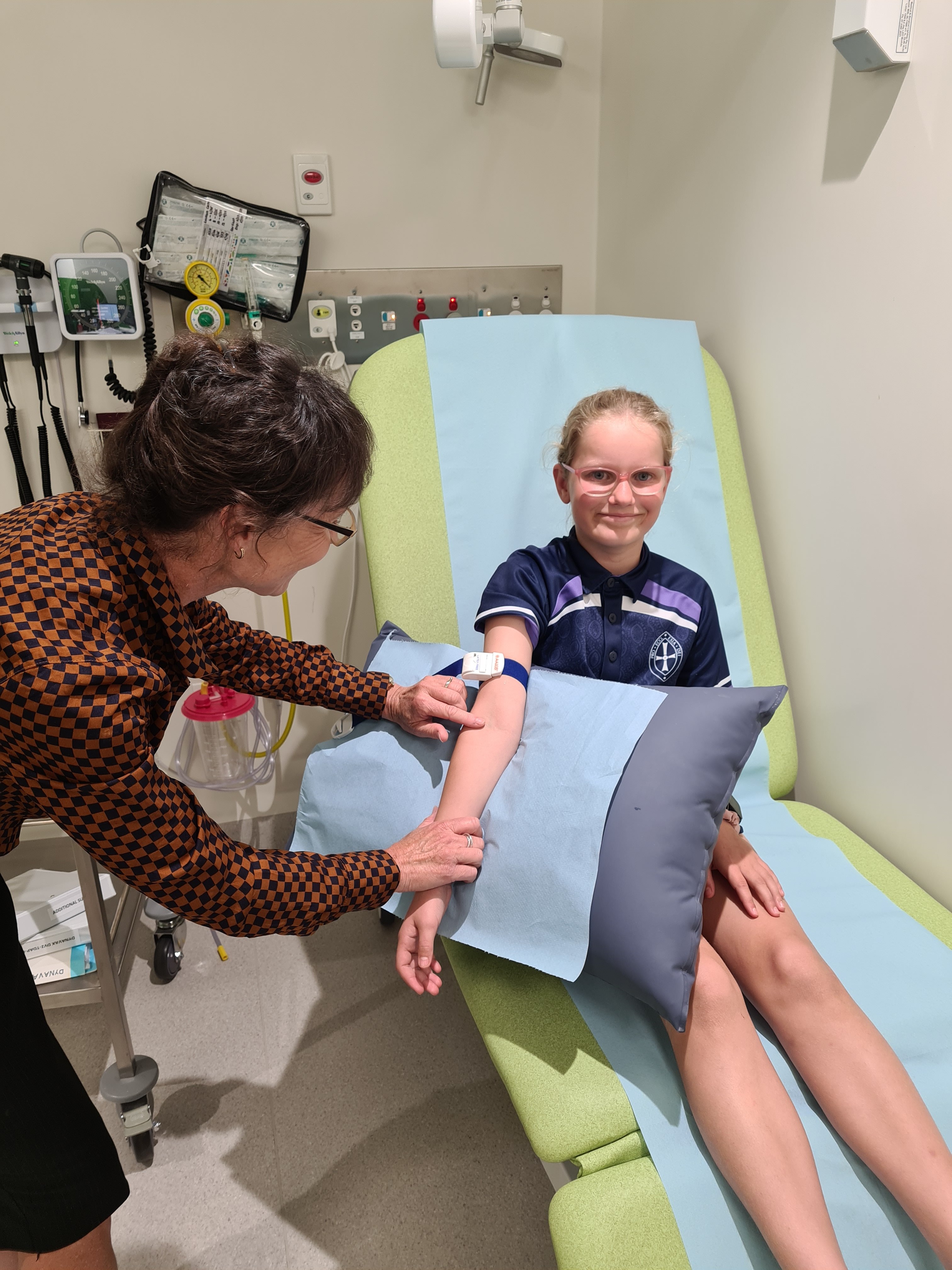Pertussis, also known as whooping cough, is caused by bacteria called Bordetella pertussis that can infect the nose, throat and lungs. For young babies who aren’t yet old enough to be vaccinated, a pertussis infection can be life-threatening.
Kids making the difference in the fight against pertussis!

When we asked our Whooping Cough in Adolescents Study participants why they wanted to be in a study where we jab you with needles, take blood samples and get you to complete a health diary every day for a week (a bit like getting even more homework), the overwhelming response was, “we want to stop other kids getting sick, we want to help”.
We had 16 remarkable young people aged between 10-17 years take part in this study looking at a potentially improved vaccine for Pertussis which uses a unique adjuvant, previously only used in Hepatitis B vaccines. Adjuvants are components added to vaccine formulation to improve the immune response to the vaccine.
Our participants and their parents and carers fully committed fully to the study, and I am happy to say we had 100 per cent completion of all study visits, follow-up safety phone calls and diary entries. Even with COVID-19 restrictions earlier in the year, we were able to complete recruitment by May. The final study visit was completed in September and we look forward to receiving results soon.
Whooping Cough Study in Young Adults
Imagine having available a 'stand alone pertussis vaccine here in Australia! At present, whenever someone needs a Pertussis booster, such as in pregnancy, it comes in combination with tetanus and diphtheria. These additional components are often not needed. Research has also shown that the current acellular pertussis vaccine used in Australia, whilst very effective in the short term, shows reduced immunity after three-to-five years.
The vaccine in our Whooping Cough Study in Young Adults, Pertagen®, has been developed using the latest DNA technology that we believe will result in longer lasting protection. It has already been licenced in Thailand since September 2016 as a booster in those over 11 years and in pregnancy, and it has been licenced in Singapore since July 2021.
Recruitment is now complete, with 102 healthy young adults enrolled aged between 18-30 years. These amazing, positive, optimistic young people have committed to study involvement over 12 months, including three clinic visits, three phone calls, the vaccine and three blood tests. The wider community in the future stands to benefit from the efforts and care of these young adults and we are so grateful to them for their time!
Now recruiting .... The SUPER Study
We are excited to be taking part in a global study investigating the first ever nasal spray vaccine for whooping cough. The vaccine is sprayed in the nose to mimic infection, and it is hoped this will produce more protective antibodies in the nose and throat. Current pertussis vaccines are great at preventing severe disease, but they still allow the infection and spread of whooping cough, so researchers aim to discover if a nasal spray vaccine can inoculate the upper airways, preventing infection and spread.
We are looking for healthy young people aged 11 to 17 years of age to be part of 600 SUPER study participants across Australia and the United Kingdom. There will be five study visits at Perth Children's Hospital over a six month period, and participants will be randomly allocated the study vaccine or the current vaccine pertussis vaccine (Boostrix), with some receiving both.
Please contact the study team on whoopingcough@telethonkids.org.au or calling 0400 450 240 for more information. Registrations of interest are also being taken for children aged six upwards who will be eligible to take part in the near future.
OPTIMUM: OPTimising IMmunisations Using Mixed schedules to prevent food allergies (currently recruiting)
Allergies are on the rise in Australia, with 3 out of every 10 babies born each year developing a food-related allergy or eczema by their first birthday. To try and combat this, the OPTIMUM Study is investigating if giving a dose of ‘whole-cell’ whooping cough vaccine at two months of age, instead of the current ‘acellular’ whooping cough vaccine, can help protect young children against food allergies and eczema.
 Babies recruited into the study receive either the whole-cell vaccine or the acellular vaccine currently on the immunisation schedule when their 6-8 week immunisations are due. The whole-cell vaccine was used in Australia until 1999 and it is still used in the vast majority of the world. Both acellular and whole-cell vaccines are safe and protect against whooping cough, they just 'train' the immune system in different ways.
Babies recruited into the study receive either the whole-cell vaccine or the acellular vaccine currently on the immunisation schedule when their 6-8 week immunisations are due. The whole-cell vaccine was used in Australia until 1999 and it is still used in the vast majority of the world. Both acellular and whole-cell vaccines are safe and protect against whooping cough, they just 'train' the immune system in different ways.
At 12 months, we conduct a skin prick test to see if the baby has any allergies, or we might see them earlier if they have any issues when they are introduced to food. All the children continue to receive their normal immunisation scheduled vaccines with their normal providers until they return to our study site to get their 18 month vaccines. Parents also have the benefit of contact with the study doctor if they have any concerns about their child's health in relation to the study.
Thanks to the amazing families taking part, we are about to hit our second recruitment milestone of 300 participants! From this point onwards, we join in with the recruitment sites around Australia involving 3000 babies nationally, but taking part is easier then ever, with just three study visits and no blood tests or vaccine diaries! So if you have a baby due in 2023 we would love to hear from you.
For further information, please contact us at OPTIMUM@telethonkids.org.au or 0400 450 240.
